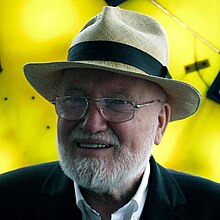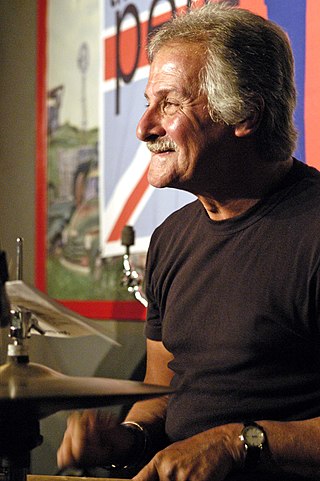
Randolph Peter Best is an English musician who was the drummer for the Beatles from 1960 to 1962. He was dismissed shortly before the band achieved worldwide fame and is one of several people referred to as a fifth Beatle.
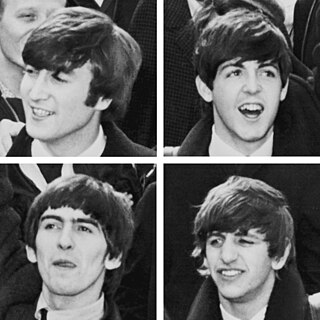
The Beatles were an English rock band formed in Liverpool in 1960, comprising John Lennon, Paul McCartney, George Harrison and Ringo Starr. They are widely regarded as the most influential band of all time and were integral to the development of 1960s counterculture and the recognition of popular music as an art form. Rooted in skiffle, beat and 1950s rock 'n' roll, their sound incorporated elements of classical music and traditional pop in innovative ways. The band also explored music styles ranging from folk and Indian music to psychedelia and hard rock. As pioneers in recording, songwriting and artistic presentation, the Beatles revolutionized many aspects of the music industry and were often publicized as leaders of the era's youth and sociocultural movements.

The fifth Beatle is an informal title that has been applied to people who were at one point a member of the Beatles or who had a strong association with John Lennon, Paul McCartney, George Harrison, and Ringo Starr. The "fifth Beatle" claims first appeared in the press immediately upon the band's rise to global fame in 1963–64. The members have offered their own views as to who should be described with the title: McCartney said on two occasions that "if anyone was the fifth Beatle", it was manager Brian Epstein and producer George Martin. Harrison stated at the Beatles' 1988 induction into the Rock and Roll Hall of Fame that there were only two "fifth Beatles": Derek Taylor, the Beatles' public relations manager, and Neil Aspinall, their road manager-turned-business-executive.
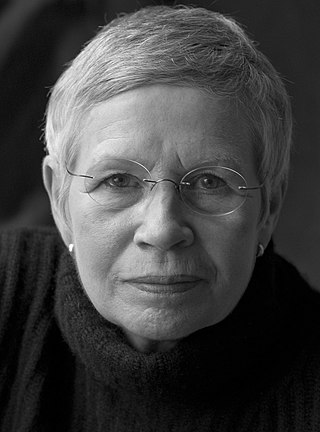
Astrid Kirchherr was a German photographer and artist known for her association with the Beatles and her photographs of the band's original members – John Lennon, Paul McCartney, George Harrison, Stuart Sutcliffe and Pete Best – during their early days in Hamburg.
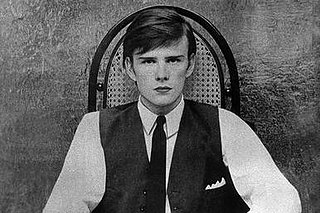
Stuart Fergusson Victor Sutcliffe was a British painter and musician best known as the original bass guitarist of the Beatles. Sutcliffe left the band to pursue his career as a painter, having previously attended the Liverpool College of Art. Sutcliffe and John Lennon are credited with inventing the name "Beetles" (sic), as they both liked Buddy Holly's band, the Crickets. They also had a fascination with group names with double meanings, so Lennon then came up with "The Beatles", from the word beat. As a member of the group when it was a five-piece band, Sutcliffe is one of several who are sometimes referred to as the "Fifth Beatle".

The Quarrymen were a British skiffle/rock and roll group, formed by John Lennon in Liverpool in 1956, which evolved into the Beatles in 1960. Originally consisting of Lennon and several school friends, the Quarrymen took their name from a line in the school song of their school, the Quarry Bank High School. Lennon's mother, Julia, taught her son to play the banjo, showed Lennon and Eric Griffiths how to tune their guitars in a similar way to the banjo, and taught them simple chords and songs.

Klaus Otto Wilhelm Voormann is a German artist, musician, and record producer.

Anthony Esmond Sheridan McGinnity, known professionally as Tony Sheridan, was an English rock and roll guitarist who spent much of his adult life in Germany. He was best known as an early collaborator of the Beatles, one of two non-Beatles to receive label performance credit on a record with the group, and the only non-Beatle to appear as lead singer on a Beatles recording which charted as a single.

My Bonnie is a 1962 album by English rock and roll singer-songwriter and musician Tony Sheridan. Sheridan, then playing in clubs in Hamburg with the Beatles, was discovered by producer Bert Kaempfert and subsequently signed with him to record for Polydor. Sheridan recorded several songs with the Beatles, of which only a single was released in 1961, the titular "My Bonnie" and B-side "The Saints", credited to Tony Sheridan and the Beat Brothers. While both songs are included here, the remaining tracks on this album were credited again to the Beat Brothers but recorded without the Beatles.

Live! at the Star-Club in Hamburg, Germany; 1962 is a double album featuring live performances by the English rock band the Beatles, recorded in late December 1962 at the Star-Club during their final Hamburg residency. The album was released in 1977 in two different versions, comprising a total of 30 songs by the Beatles.

The Star-Club was a music club in Hamburg, Germany, that opened on Friday 13 April 1962, and was initially operated by Manfred Weissleder and Horst Fascher. In the 1960s, many of the giants of rock music played at the club. The club closed on 31 December 1969 and the building it occupied was destroyed by a fire in 1987. The address of the club was Große Freiheit 39 in the St. Pauli quarter of Hamburg. Große Freiheit is a side street of the Reeperbahn. The club had a capacity of 2,000 people, and cinema-style seating.
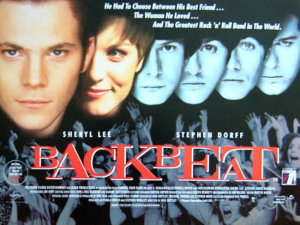
Backbeat is a 1994 independent drama film directed by Iain Softley. It chronicles the early days of The Beatles in Hamburg, West Germany. The film focuses primarily on the relationship between Stuart Sutcliffe and John Lennon, and also with Sutcliffe's German girlfriend Astrid Kirchherr. It has subsequently been made into a stage production.
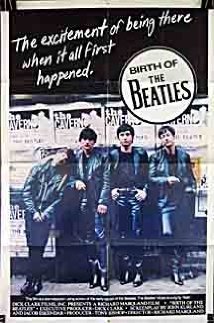
Birth of the Beatles is a 1979 American biographical film, produced by Dick Clark Productions and directed by Richard Marquand. It was shown as a TV film on ABC in the United States, and received a theatrical release in other countries. The film focuses on the early history of the Beatles. It was released nine years after the Beatles disbanded, and is the only biographical film about the band to be released while all four members were alive. Pete Best, the Beatles' original drummer, served as a technical advisor for the production.

Allan Richard Williams was a British businessman and promoter who was the original booking agent and first manager of the Beatles. He drove the van to take the young band to Hamburg, West Germany, in 1960, where they gained the vital show business experience that led to their emergence on the world stage. Williams was also a promoter and agent of a number of other Liverpool rock acts, helping stoke the Merseybeat boom of the early 1960s.
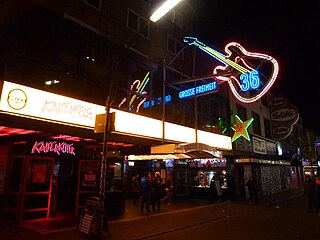
Kaiserkeller is a music club in the St. Pauli quarter of Hamburg, Germany, near the Reeperbahn. It was opened by Bruno Koschmider on 14 October 1959. The Beatles had a contract with Kaiserkeller to play there in 1960.

"Be-Bop-a-Lula" is a rockabilly song first recorded in 1956 by Gene Vincent and His Blue Caps.
"Hallelujah I Love Her So" is a single by American musician Ray Charles. The rhythm and blues song was written and released by Charles in 1956 on the Atlantic label, and in 1957 it was included on his self-titled debut LP, also released on Atlantic. The song peaked at number five on the Billboard R&B chart. It is loosely based on 'Get It Over Baby' by Ike Turner (1953).
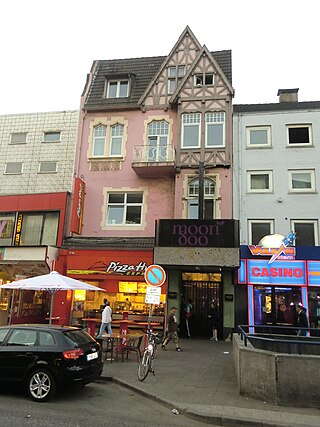
The Top Ten Club was a music club in Hamburg's St. Pauli district at Reeperbahn 136, which opened on 31 October 1960 and kept its name until 1994.
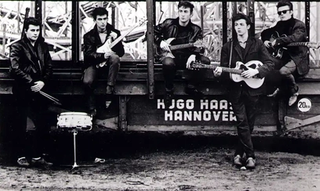
The original lineup of the Beatles, John Lennon, Paul McCartney, George Harrison, Stuart Sutcliffe and Pete Best, regularly performed at different clubs in Hamburg, West Germany, during the period from August 1960 to May 1962; a chapter in the group's history which honed their performance skills, widened their reputation, and led to their first recording, which brought them to the attention of Brian Epstein. In November and December 1962 they played with Ringo Starr on drums.
Adrian Barber was an English musician and producer most noted for recording the Beatles Live! at the Star-Club in Hamburg, Germany; 1962, producing the Allman Brothers Band's self-titled debut album, along with the Velvet Underground's album Loaded.
